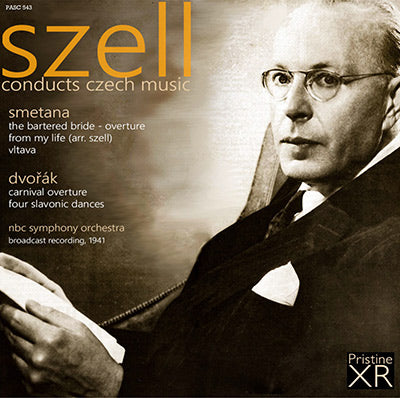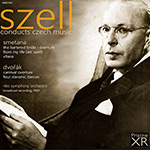
This album is included in the following sets:
This set contains the following albums:
- Producer's Note
- Full Track Listing
- Cover Art
- Concert review, 1941
George Szell is announced as a Czech conductor for this 1941 NBCSO broadcast, presenting an entire programme of Czech music. The latter is true, the former claim requires clarification. Szell was born in Budapest in 1897, so by birth he was a Hungarian. He grew up in Vienna, and his early conducting career was spent in both France and Germany. However his longest residence, before settling in America, was in Prague as director of the opera between 1929 and 1937, and this seems to be the source of the claim for Czech citizenship. Szell had ended up in the USA partly by accident. He was in transit from Australia to Europe when war broke out and ended up staying in the USA, eventually for good. In 1941 his most pressing need was to find work, and having already declined two invitations from Toscanini to conduct the NBCSO due to prior commitments, he readily made himself available in the spring of 1941. Szell knew that these four nationwide radio broadcasts could establish him as a notable conductor in America. Claiming Czech citizenship (now an occupied country), rather than Hungarian (a country allied with Germany), might have been a deliberate decision, but whether that was Szell’s choice or NBC’s is not known.
Szell’s first NBCSO concert, the week before the one presented here, was warmly welcomed in the press. The New York Times though he had ‘established himself as a conductor of truly distinguished abilities.’ For the Czech concert, Szell decided to orchestrate Smetana’s String Quartet in E minor, believing that ‘it deserves wider musical horizons in orchestral form than are possible...for the string quartet.’ Two Dvořák pieces were selected to commemorate the composer’s centenary. The all-Czech programme was, as one listener noted ‘eclectic’, but confirmed the opinion that Szell was ‘evidently a conductor of the highest rank.’
Although Toscanini grumbled about Szell’s rehearsal technique, he evidently held his younger colleague in sufficiently high regard to invite him back for two more NBCSO concerts in 1943. By then Szell had begun a very successful three-year stint at the Metropolitan Opera as well as undertaking guest conducting in Boston, Los Angeles, and New York. In 1944 he began an association with the Cleveland Orchestra that would last until his death in 1970.
GEORGE SZELL A Concert of Czech Music
1. RADIO Intro (1:41)
2. SMETANA The Bartered Bride - Overture (6:36)
SMETANA (arr. Szell) From My Life (String Quartet No. 1)
3. 1st mvt. - Allegro vivo appassionato (7:30)
4. 2nd mvt. - Allegro moderato à la Polka (5:08)
5. 3rd mvt. - Largo sostenuto (8:57)
6. 4th mvt. - Vivace (6:43)
7. DVOŘÁK Carnival Overture (9:05)
DVOŘÁK Four Slavonic Dances
8. Dance in C major, Op. 46, No. 1 - Furiant (Presto) (3:47)
9. Dance in A flat major, Op. 46, No. 3 - Polka (Poco allegro) (4:40)
10. Dance in C major, Op. 72, No. 2 in E minor - Dumka (Allegretto grazioso) (5:36)
11. Dance in C major, Op. 72, No. 7 in C major - Kolo (Allegro vivace) (3:00)
12. SMETANA Vltava (Die Moldau) (12:11)
13. RADIO Final announcements (1:43)
NBC Symphony Orchestra
conducted by George Szell
XR remastering by Andrew Rose
Cover artwork based on a photograph of George Szell
Broadcast of 8 March 1941
NBC Studio 8H, New York CIty
Due to time constraints all announcements made between performances have been cut, retaining only those at the start and end of the broadcast.
Total duration: 76:37
SZELL CONDUCTS IN RADIO CITY
It is not possible at the hour of writing to say as much about the remarkable performances of Mr. Szell as they deserve. He is evidently a conductor of high rank. As much was manifest at his first concert with the NBC Symphony Orchestra of a week ago, when he gave an eclectic program. Last night the program at Radio City with the same orchestra was entirely of music by Czech composers.
The observance was appropriate in more ways than one, first because of the inspiration, the sincerity, the special eloquence and beauty of these works; secondly, because this year of 1941 is the hundredth anniversary of Dvorak, whose music figured prominently on the program; lastly, because the spirit of the great Czech people is impressively manifest in their music, which Mr. Szell conducts with a fascination that we have not heard equaled.
"Bartered Bride" Overture
The program began with the overture to "The Bartered Bride." We heard its continuance in the form of the last part of Mr. Szell’s own orchestral transcription, new to the American repertory, of Smetana's String Quartet, "From My Life." This is an admirable transcription, of refreshing simplicity and appropriateness, after the bedevilments and distortions of other quartet music that we have heard inflated for orchestra. Mr. Szell's instrumentation does not inflate; it reveals it as if the composer had dreamed of just such an instrumental guise for his ideas.
So instrumentated, and interpreted, it was wonderfully fresh and delightful music, full of genius. Why Dvorak’s "Carnival" overture was played when his overture, "Husitka,” less known, much more dramatic, much greater, was undoubtedly available, is not easy to explain. Mr. Szell, with complete conductor's mastery, made much of a relatively weak and conventional work, in a way that excited the audience. But what was of more consequence was the performance of four of the Dvorak Slavonic Dances and the tone-poem, '‘Vltava" of Smetana.
Great Variety in Dances
It is now the fashion to look down upon the Dvorak dances and the tone-poem, too, at least on the part of our "avant-garde” of the symphony art. Nothing appears more short-sighted and fallacious. A whole world is opened by the Dvorak Dances, which are of inexhaustible variety, inventions, original and unduplicated orchestration, and sheer beauty. These pieces, and the work of Smetana, come from what may well be called a golden age of Czech music; and it may be forgotten that Czech music and Czech musicians permeated the music of the classic epoch of the Viennese school and were the fertile ground from which many of its finest characteristics developed.
From what Mr. Szell did with these works we anticipate very much of his reading next week of the great Schubert C major symphony. For there is much closer relation between Dvorak and Schubert than is commonly realized, and Dvorak and other great masters too, as there is a heroic authenticity and smack of soil in Smetana's tone-poem which are invincible. Mr. Szell, in a unique degree, knows how this music should be played and how to make an orchestra play it. And here was that spontaneity, integrity, naturalness and creative glow that American music has yet to attain.
The New York Times, 9 March 1941

